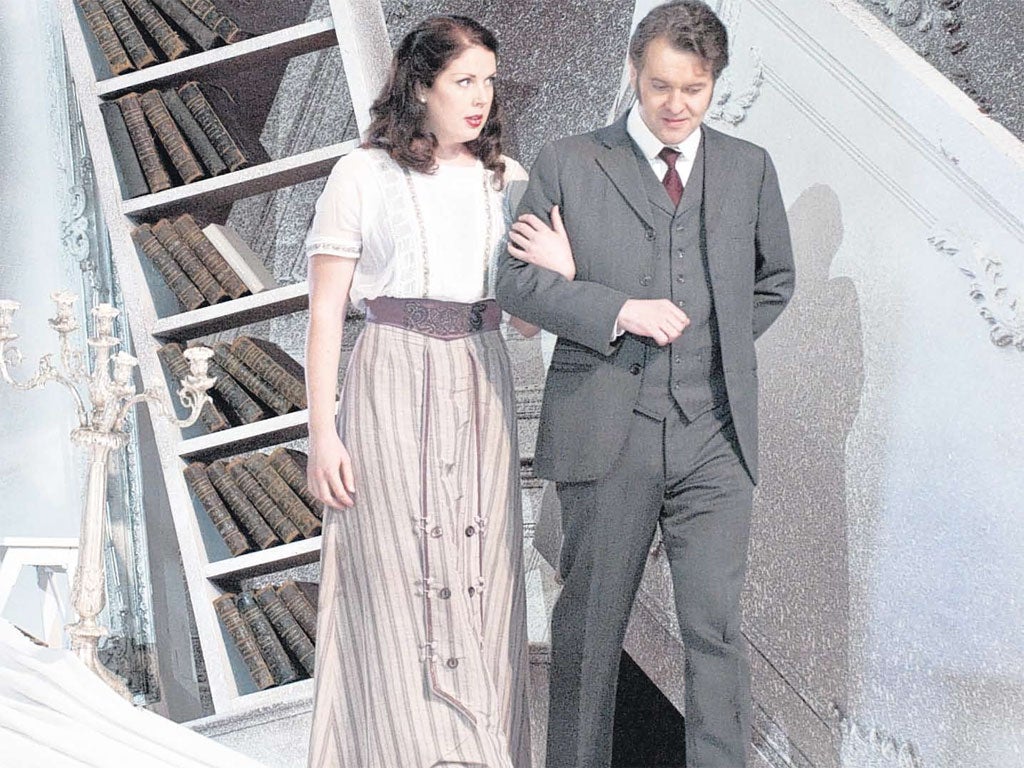Yevgeny Onegin, Opera Holland Park, London / Pelléas et Mélisande, and other Proms, Royal Albert Hall, London / Cinderella, Blackheath, Community Opera, London
A new production of a Tchaikovsky opera observes that heartache is a worldwide, eradicable complaint

Cut through with the sour, ironic voice of Pushkin's verse-novel, Daniel Slater's dreamlike production of Tchaikovsky's Yevgeny Onegin is framed in a series of flashbacks, as Anna Leese's Tatyana and Mark Stone's Onegin remember their younger selves. One is now married to a lauded general (Graeme Broadbent's Gremin), the other still alone, haunted by the duel in which he killed his dearest friend, Lensky, and the moment he rejected Tatyana. Designer Leslie Travers's landscape of broken furniture and lowered chandeliers suggests a grand estate long-abandoned, peopled with ghosts. When Lensky dies, the stage is littered with the corpses of duellists. When Onegin turns from Tatyana, he is surrounded by lovesick girls, each clutching a letter addressed to him.
The youth of Onegin's characters, and the stifling codes of honour they must follow, are painfully evident, though Tatyana's frisky sister Olga (Hannah Pedley) pre-empts the happy ending given to her by Pushkin by cannoodling with an army officer over Lensky's corpse. Slater's transposition to the 20th century is still more problematic. Act I opens on the cusp of revolution, Act II in the First World War, Act III in a world transformed by Communism. Electricity has replaced candlelight and the St Petersburg Ball is a party rally. Class distinctions between Onegin and the Larin family are blurred. To an angry serf with a sickle in his hand, they all look the same.
Mollified by Tchaikovsky's score, the cracks in Slater's concept matter less in performance. Though Alexander Polianichko's tempi are unsteady and the City of London Sinfonia's cellos sound parched, the woodwind detailing is delectable, those little sighs passed from flute to oboe to clarinet to bassoon. Peter Auty's Lensky is handsomely sung, while Pedley lends Olga an unsettling watchfulness. As in Così fan tutte, much sorrow could be avoided if the sisters switched places. Stone's icy hauteur and Leese's dewy intensity cannot co-exist. Her Letter Song – a too-dainty moniker for a 20-minute confession of desire – is outstanding.
The 2012 BBC Proms season is studded with opera, from Peter Grimes and Le nozze di Figaro to Nixon in China. With nothing more than a chaise-longue and an armchair for props, Sir John Eliot Gardiner's Pelléas et Mélisande (Prom 3), with the cast of the Opéra Comique production and the Orchestre Révolutionnaire et Romantique, set the bar vertiginously high. Debussy provided the scenery: a wash of blues, now stippled with the glance of sunlight on water, now thick with darkness, the tones vivid in the transparent textures of the period strings, the admonitory rasp of the horns, the careless fronds of wooden flutes.
The genetic link to Tristan und Isolde is self-evident, but the pre-echoes of Duke Bluebeard's Castle were startling in the Act III confrontation between Laurent Naouri's embittered Golaud and Phillip Addis's naive Pelléas. Gardiner can be an overly controlling conductor. Here the slow-burn technique had real purpose. Naouri, Addis and their enigmatic Mélisande, Karen Vourc'h, sang sotto voce for much of the opera. When their voices opened out – into jealous rage or erotic abandon – the effect was electric.
Alice Coote and Julius Drake continued the French theme in a recital of songs by Fauré, Hahn and Poulenc at Cadogan Hall, each one opulent with sensuality, as though we were eavesdropping on a tryst. In the mid-concert interview, Clemency Burton-Hill expressed surprise that Coote should be singing this repertoire. Had Burton-Hill heard her sing Massenet's Prince Charming or Charlotte, she would know that Coote's engagement with French music is every bit as profound as with German, English and Italian.
Summer's most regrettable clash came on Wednesday as Blackheath Community Opera's enchanting production of Massenet's Cinderella twinkled to a close 15 minutes before the start of Hervé Niquet's performance of Handel's Water Music and Music for the Royal Fireworks with Le Concert Spirituel (Prom 7). Where's a jet-pack when you need one? Listening later online, I had to imagine Niquet's trademark gyrations. The sound was fabulous, all gusto and brio and feather-boa trills.
Back at Harry Fehr's cutesome celebrity-culture reading of Perrault's fairy tale, it was time to break open the tissues as fairies of all ages, from primary-school children to pensioners, sang with Sally Silver's Fairy Godmother and a sublime quintet of Trinity Laban students in nighties, pyjamas and wings. From Louise Winter's gloriously vulgar stepmother, to the ditsy sisters of Charlotte Baptie and Kate Howden, Grant Doyle's hen-pecked Pandolfe, and Stephanie Marshall's pouting Prince, this was a treat, stylishly shaped under conductor Nicholas Jenkins, whose apprenticeship with Marc Minkowski showed to great effect. Fairies aside, the evening belonged to soprano Anna Patalong, Cinderella here, Lauretta in Holland Park's recent Gianni Schicchi, a tender and alluring voice.
'Yevgeny Onegin' (0300 999 1000 to 4 Aug; 'Cendrillon' (020-8463 0100) 2pm today; The Proms (0845 401 5040) to 8 Sep
Subscribe to Independent Premium to bookmark this article
Want to bookmark your favourite articles and stories to read or reference later? Start your Independent Premium subscription today.

Join our commenting forum
Join thought-provoking conversations, follow other Independent readers and see their replies